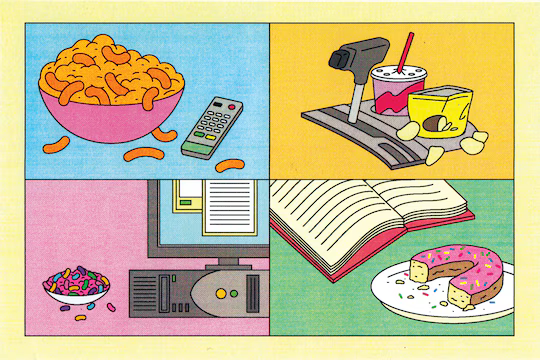In today’s fast-paced world, eating has often become a secondary activity, overshadowed by work, screens, and multitasking, the Washington Post reports.
This phenomenon, known as distracted eating, has been linked to overeating, reduced enjoyment of food, and weight gain. Experts recommend mindful eating as a way to counteract these negative effects and create a more fulfilling relationship with food.
Modern lifestyles allow people to eat anywhere and anytime, leading to a blend of activities during meals. According to Lotte van Dillen, a social psychology professor at Leiden University, around 70-75% of eating occasions are accompanied by distractions.
This habit has significant consequences:
- Increased consumption: Distractions impair our ability to sense satiety signals, leading to overeating. Studies show distracted eaters often consume more food and feel hungry sooner after eating.
- Blunted taste and enjoyment: Distractions dull taste perception by reducing activity in brain regions associated with taste and reward processing. This phenomenon, described as a “sledgehammer effect,” results in less enjoyment of food and may prompt additional eating to compensate for the lack of satisfaction.
Research highlights how distractions impact sensory and cognitive functions:
- Impaired taste: A 2013 study found that participants engaged in a challenging mental task added 50% more sugary syrup to lemonade but didn’t find the drink any sweeter.
- Dulled smell and taste processing: Distractions affect brain areas like the insula (taste processing) and prefrontal cortex (decision-making), as well as their connectivity with reward regions.
- Reduced enjoyment: A 2024 study revealed that distractions during eating, reading, or watching TV reduced the anticipated pleasure of these activities.
Adopting mindful eating practices can help counteract the negative effects of distracted eating and improve the overall eating experience. Here are some tips:
- Reduce distractions
Start by setting aside your phone or turning off the TV. While eliminating distractions entirely may not always be practical, focusing on the meal can significantly improve your awareness and satisfaction. - Embrace sensory eating
Pay attention to the taste, texture, smell, and appearance of your food. Imagine being a food critic and describe the flavors and sensations to yourself. This practice enhances enjoyment and helps regulate portion sizes. - Plan dedicated mealtimes
Establish specific times to eat and drink without rushing. This not only improves your focus but also makes eating a more joyful and intentional activity. - Slow down and chew more
A 2018 meta-analysis showed that chewing thoroughly reduces the amount of food consumed and enhances feelings of fullness. Eating slowly gives your brain time to process satiety signals. - Practice mindful awareness
Periodically check in with yourself while eating, even if you are distracted. Notice your hunger and fullness cues and reflect on what prompted you to eat. - Foster social eating
Eating with others can be a positive distraction. Conversations often slow the pace of eating, allowing satiety signals to register more effectively.
Mindful eating isn’t solely about restriction or control. It’s about savoring the moment, enjoying food in its entirety, and fostering a healthier relationship with eating. As van Dillen points out:
“Self-regulation shouldn’t be all about self-control but also about allowing you to enjoy consumption experiences in the right way.”








